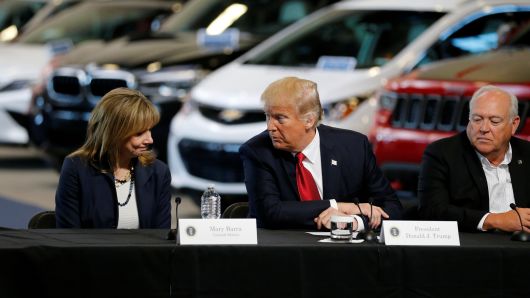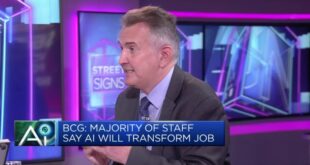
Jonathan Ernst | Reuters
President Donald Trump talks with auto industry leaders, including General Motors CEO Mary Barra (L) and United Auto Workers (UAW) President Dennis Williams (R) at the American Center for Mobility in Ypsilanti Township, Michigan, U.S. March 15, 2017.
The auto industry cheered on Trump’s proposal. Car manufacturers long argued that adding fuel-saving technology on every single vehicle is overtly expensive and will skyrocket car prices. In May, CEOs and other executives from 10 U.S. and foreign carmakers met with Trump at the White House to push their defense. The administration agreed, saying the Obama-era standards could cause consumers to keep their old cars rather than upgrading to a new model with better fuel economy and pollution control.
Those claims are disputed by some industry experts. Experts believe that automakers have the capacity to create new vehicles with greater efficiency without exorbitantly raising the price, but are begrudged to do so.
“Anyone who tries to downplay the engineering innovation of the auto industry is selling them short,” said Friedman.
A recent report by the Consumer Federation of America found that nearly a fourth of “all new 2017 models” were less expensive than their counterparts in 2011, yet all vehicles saw a 1 mpg to 10 mpg increase. It also suggests what experts are arguing today: Even if the costs are greater, the savings in fuel will offset higher prices. The study concludes that rolling back the standards would not only “cause great harm” to consumers but also weaken auto sales because of consumer demand for greater efficiency.
Carla Bailo, president and CEO of the Center for Automotive Research, also suggested that the administration’s figures are “inflated” and “highly doubtful,” because car manufacturers are investing in technology for greater fuel efficiency around the world. The Obama-era standards are actually less stringent than those set by the European Union and South Korea — requiring a fuel economy of 56 mpg in the same time period. Bailo explained that “volume will of course help mitigate” the costs that have carmakers concerned.
If the rollbacks are approved, car manufacturers will produce new vehicles with doddering technology, specifically for the U.S. market, she said. The result would save automakers vast amounts of money necessary to fund for redesigning light and more aerodynamic models to meet 2012 standards.
“They want to stretch those investments as long as possible, and American consumers are paying the price,” said Friedman.
 EU News Digest Latest News & Updates
EU News Digest Latest News & Updates



